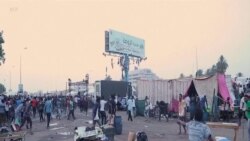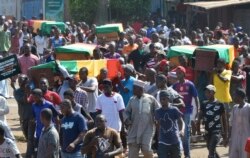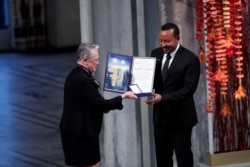There was rage across the African continent last year, says Human Rights Watch in its annual report, with no sign of cooling down in 2020.
African public outraged
In Sudan and Guinea, there were manifestations of frustration with entrenched leadership. In Zimbabwe, protests mostly about economic conditions. While in rural Ethiopia and the Democratic Republic of Congo, they were about the rights of communities displaced by conflict.
But the public outrage is good to see, said Human Rights Watch (HRW) at its Johannesburg report unveiling.
Africa Advocacy director for HRW Carine Kaneza Nantulya says ordinary citizens took the spotlight this year.
"We've seen, I think, the average men and women of the African continent taking agency, being agents for their own for the changes they wanted to see, which we saw an increase of peaceful protest in different countries,” she said. “The second takeaway is that we've also seen a backsliding from government in terms of political and civic space.”
More expected from African leaders
That has taken the form of outright police aggression and repression, as seen in Southern Africa, says the group’s Southern Africa researcher, Dewa Mavhinga.
"We expected more from southern African leaders, including President Ramaphosa of South Africa, based on their commitment and promises to fulfill people's rights across the region, “ he said. “But we saw that there was a constriction of space for human rights defenders in countries like Zimbabwe,” Mavhinga told VOA.
“There was a clampdown on protesters, excessive use of force by the police and other arms of the security forces,” he said. “There was no accountability whatsoever.”
Mavhinga said African leaders need to do more, as the people bring about change on their own. He pointed to the nation with the continent’s most progressive constitution, South Africa, which is taking up the rotating chairmanship of the African Union this year.
"South Africa has to step up to the plate,” he said. “It has to deliver on human rights and draw from (Nelson) Mandela's legacy,” said Mavhinga. “But we will have to continue to push,” he said.
Hope in the Horn (and Sudan)
But there was also a glimmer of hope, as Ethiopian Prime Minister Abiy Ahmed won the Nobel Peace Prize for his reform agenda and for his reconciliatory moves with arch-enemy Eritrea, noted HRW’s Africa deputy advocacy director, Babatunde Olugboji.
"He's done quite a few great things in Ethiopia, he’s released political prisoners and is actually reforming some repressive laws,” he said. “He sort of made peace with Eritrea. So things are moving in the right direction, mostly,” said Olugboji. “There's still a lot to be done in Ethiopia,” he added.
Overall, Olugboji said it was an extraordinary year, raising hopes for a more outspoken African public in 2020.
He pointed to an event few people could have predicted at this time last year: the popular uprising that led to the ouster of Sudanese President Omar al-Bashir after a 30-year rule marked by oppression, human rights abuses, and attempted genocide in the Darfur region.
"I think people are becoming more aware of their rights,” said Olugboji. “Who could have thought Bashir in Sudan would be overthrown?”







